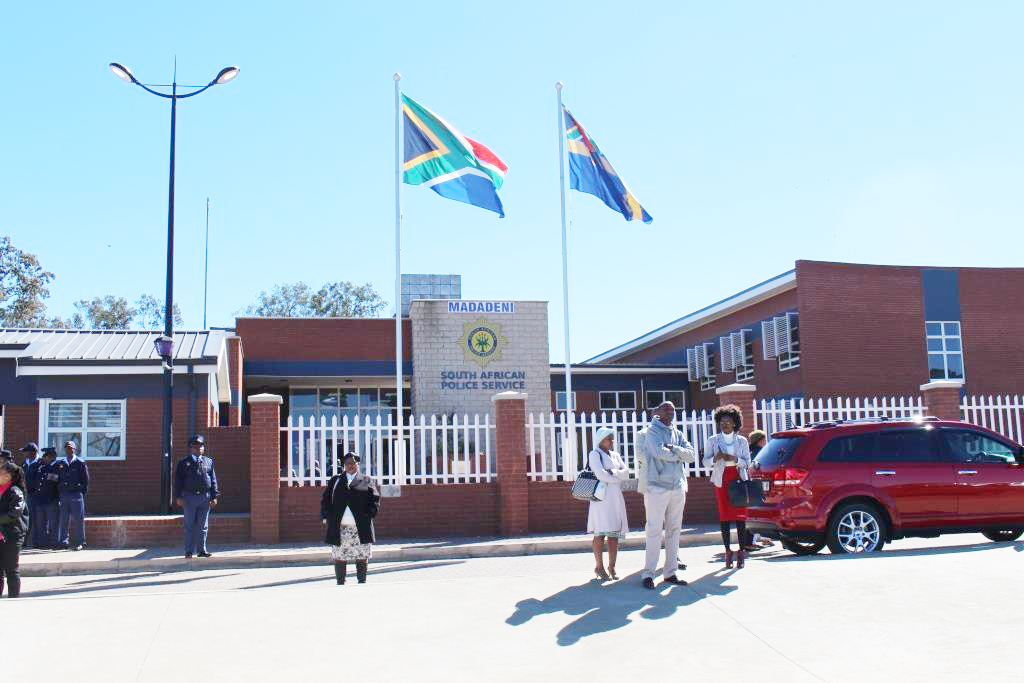Sep 2016 - 2nd edition
Sep 2016 - 2nd edition Estelle Greeff
Translations
Police officers honoured
Police officers honoured andileDeputy President Cyril Ramaphosa says the killing of police can never be justified and must come to an end.
“We must build a culture that values police that sees them not merely as public servants, but as courageous men and women who have answered a calling.”
The De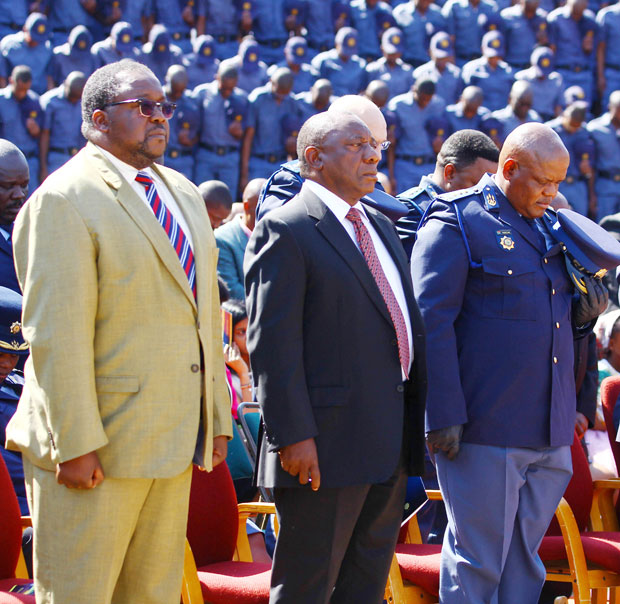 puty President was speaking during the National Commemoration Day ceremony to remember members of the South African Police Service (SAPS) who lost their lives in the line of duty. The ceremony was held in honour of police officers who lost their lives between 1 April 2015 and 31 March 2016.
puty President was speaking during the National Commemoration Day ceremony to remember members of the South African Police Service (SAPS) who lost their lives in the line of duty. The ceremony was held in honour of police officers who lost their lives between 1 April 2015 and 31 March 2016.
He added that citizens should work together to create a nation that cares for each other.
"Together we must build a nation that values the sanctity of life and protects the most vulnerable.
We ask our nation to unite in saying that the murder of our police officers is unacceptable and it must end."
“The death of one police officer is one death too many. It is thus heart-breaking to learn that during the last year 72 members of the police service lost their lives, 40 of them in the line of service,” said Deputy President Ramaphosa.
The youngest of the police officers who lost their lives was Constable Sabelo Manyanga (28) who was shot two days before Christmas last year while on duty in KwaZulu-Natal.
He had three children with the youngest being one month old.
The Deputy President said the murder of police officers should not only be condemned but that communities should commit to working with the justice system to ensure that those who commit these crimes pay for their deeds.
“Communities have a vital role to play. By participating in Community Policing Forums they can have a voice in local policing and become aware of crime trends in their areas.”
Deputy President Ramaphosa told the families of the police officers that the country was behind them.
“May you all find comfort in the knowledge that millions of South Africans truly value your loved ones and the service they rendered with distinction to the people of South Africa and our nation as a whole.
As the names of your loved ones are engraved today on the monument, please know that your pain and your sacrifices remain engraved in the hearts of all of us as South Africans."
Crime fighting scores victories
Crime fighting scores victories andileEfforts by the South African Police Service (SAPS) to fight crime are bearing fruit in some sectors.
The 2015/16 crime statistics that the Police Ministry released in Parliament recently showed a decrease in crimes committed in the country.
The statistics for the period 1 April 2015 to 31 March 2016 cover various categories of crime.
Serious crime reported to the police decreased by 1.4 percent, but contact crimes remain a problem.
“We are registering progress. We are beginning to see a decreasing trend. The only problem is contact crimes,” said Police Minister Nathi Nhleko.
In total 2.1 million charges were reported to the police in 2015/16.
About 1.7 million cases (or 83 percent) of these were reported by members of the public, with the rest having been detected by police activity.
Of the 1.7 million community-based reported crimes, about 65.9 percent are a result of contact and property-related crimes. Contact crimes, which include crimes against a person, constituted the most charges reported by communities, at 35.2 percent.
This was followed by property-related crimes at 30.7 percent and other serious crimes at 27 percent.
Provincially, crime levels in Limpopo and Mpumalanga increased, while levels all other provinces decreased. The Northern Cape remained stable.
Categories of crime
The statistics also show that the murder rate is now 34 per 100 000, up from 33 last year. For the reporting period, 18 673 murders were recorded nationally, up from 17 805 in 2014/15.
Police said Northern Cape is the only province that has recorded a decrease in the number of murders.
Countrywide, attempted murder increased by 3.4 percent in 2015/16, with 18 127 cases reported.
Crime statistics:
- Sexual offences decreased by 3.2 percent with 51 895 cases reported.
- Robbery with aggravating circumstances increased by 2.7 percent to 132 527 cases
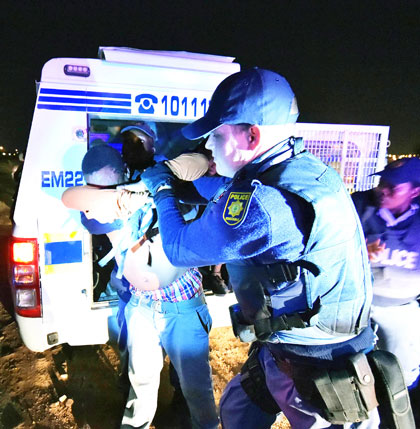
- Common assault went up 2.2 percent to 164 958 cases but robbery of residences decreased by 2.7 percent
- Robbery of non-residential properties increased by 2.8 percent
- Car hijackings increased by 4.3 percent but truck hijackings fell by 7.4 percent
- Arson decreased by 4.4 percent
- Malicious damage to property decreased by 0.6 percent to 119 901 cases in the current financial year
- Commercial crimes increased by 3.1 percent while shoplifting decreased by 3.6 percent to 68 786 cases.
Minister Nhleko said many of the crimes were connected to the social challenges faced by South Africans as well as drug use and alcohol consumption.
“As society as a whole, we need to put up quite an effort to deal with the social foundation of contact crime,” he said.
Police committed to winning fight
Police committed to winning fight Estelle GreeffActing National Police Commissioner Lieutenant-General Kgomotso Phahlane said the gains made in the fight against crime show that police are working hard.
“When we say that we have made progress, sometimes it is not convincing, especially when we talk of … lives being lost… But the downward trend suggests our efforts are making a serious dent in reducing crime,” he said during the release of the crime statistics.
Phahlane said the SAPS will continue to work hard turn the picture despite the profession being a thankless job.
“We remain loyal and committed to the fight against crime.”
Police attributed the success to their “Back to Basics” approach, which requires that police act with integrity, discipline and professionalism.
Other efforts include enhanced police visibility, which implies the presence of more police officers in uniform to minimise the chances of crime being committed.
News in brief - Sep 2016
News in brief - Sep 2016 andileIngula Unit 1 comes into commercial operation
Eskom’s Ingula Plant Pumped Storage Scheme’s third unit recently came into operation and is currently pumping an estimated 1000MW into South Africa’s power grid. The commercial operation of the unit is further proof that the utility is on its way to ensure there is enough supply for all South Africans.
Coega unveils massive investment
The Coega Industrial Development Zone (IDZ) unveiled a massive historic R11 billion worth of investment from Beijing Automobile International Corporation (BAIC) for manufacturing of automobile plant. The BAIC investment was an outcome of the Forum on China Africa Cooperation valued at about R100 billion and will have a positive impact on the GDP in the Eastern Cape Province estimated at R945.1 million.
Gauteng online admission a success
The Gauteng Depart-ment of Education’s online application system has been very successful since it was introduced earlier this year. The online application system which specifically targeted Grade 1 and 8 learners has received a total of 682 142 applications. To date 306 schools have successfully placed learners for the 2017 academic year however all applications received after the closing date will be.
Access to ARTs made easy
Access to ARTs made easy andileThe Department of Health is one step closer to ensuring universal access to Anti-Retroviral Treatment (ART).
The department announced that from this month it will offer the test-and-treat service to all HIV-positive patients in line with the World Health Organisation’s (WHO) guidelines.
In May this year, Minister Aaron Motsoaledi announced during his budget speech that from 1 September 2016 South Africa would implement the new WHO guidelines.
The new guidelines state that people who are currently eligible to start treatment at CD4 <500 can now be treated, regardless of their CD4 levels.
Over the years the Department of Health has made sure that HIV-positive pregnant women, children under five years as well as HIV and TB co-infected patients receive ART regardless of their CD4 count. The department's new treatent plan will contribute to the National Development Plan’s goal of increasing life expectancy to at least 70 years by 2030. The new policy means people diagnosed with HIV can also live long and healthy lives once they are on ARV medication.
“The National Department of Health is aware that this announcement will result in more HIV-positive people accessing ART services, which may lead to congestion and increased waiting times at health facilities.”
To ease the burden the department has initiated a process of dispensing and disributing medicine in a that is convenient to patients.
Ekurhuleni youth get free ICT training
Ekurhuleni youth get free ICT training andileEkurhuleni Metropolitan Municipality is providing free digital training to young people to help them become confident when using technology.
The free online Microsoft Information Communication Technology (ICT) training programme will enable them to write and create mobile applications as well as create games and websites. The training programme, which started in mid-August, is open to young people in Ekurhuleni aged between seven and 21. Through the programme the youth will learn essential basic computer skills, digital literacy, creative coding, app studio and touch development.
Ekurhuleni Metropolitan Municipality Head of Division for ICT Lydia Ntlhophi said the aim of the programme is to encourage an interest in ICT among young people. “We have free Wi-Fi in most of our townships therefore we want to use and maximise that investment. We’ve realised that young people are roaming the streets and are not participating in the digital world so we want to bring them on board and tap into their innovative and creative minds so that they can compete. She adds that it was important for both young and old people to start using technology and become computer literate so that they don’t miss out on opportunities. 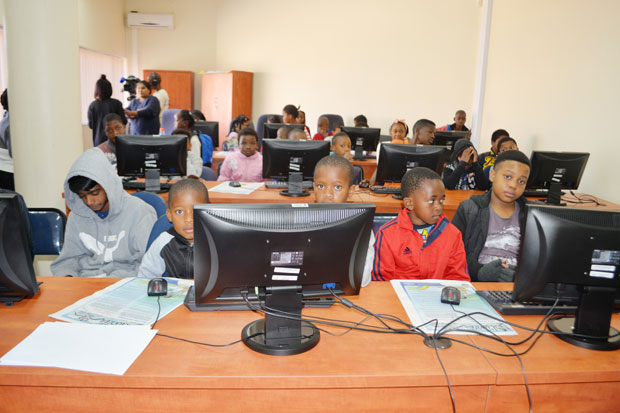
"The pilot programme, which is now running, is expected to continue until next year and has so far attracted more than 480 young people to the city’s libraries. The Germiston Library has an intake of 164 while the Ekurhuleni Library has 318 students. This is our first intake and whatever lessons are learnt from this, we’ll take them forward and perfect this course. We will take on another group of students from January until March and we will be expanding this to more libraries,” she says.
The programme will see learners work in groups to decide on a project towards the end of the course and develop it from start to finish with the support of their mentors. Learners are then expected to obtain an 80 percent pass rate in the digital numeracy course for them to move on to the next level. Learners are then given an option to pursue a six-week course on computer analytics which is also offered for free at Ekurhuleni libraries.
Elderly woman gets new home
Elderly woman gets new home andileThe days of living in a shack are over for Hlengiwe Gretta Dineka and her dignity has been restored. Dineka (63) is yet another resident to benefit from government’s ongoing initiative to provide people with decent shelter.
She is the first resident from Bekkersdal to receive a house from the newly formed/merged municipality which now goes by the name of Rand West City Local Municipality. It services the jurisdiction of Randfontein and Westonaria as a whole. Dineka told Vuk’uzenzele that after spending more than 20 years living in a shack her life has changed for the better. 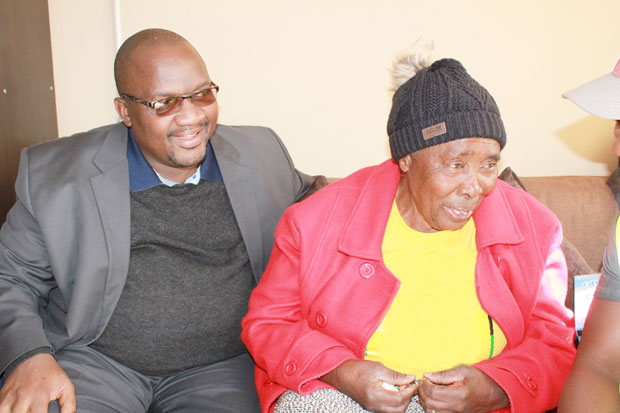
“I used to stay in a shack with my family and in all honesty things were tough. I still can’t believe that I have received this house and I still pinch myself to make sure that I’m not dreaming. I’ll forever be thankful to the Rand West City Local Municipality and TEMI Construction for what they have done for me,” said Dineka. According to Rand West City Local Municipality spokesperson Tshidiso Tlharipe, the municipality aims to be a local government that will provide decent shelter and efficient basic services to residents.
“The grandmother was very excited to say the least because one of the things in her life had been restored. She had received a roof over her head and she stated that even if she dies, she’ll be able to leave it behind for her family and that’s what we ultimately wanted to achieve. We are happy that we have started the 2016/2017 term on a high note where we have built a house for an elderly person,” said Tlharipe.
Embracing our country, our heritage
Embracing our country, our heritage andileThe coming together of Heritage and Tourism Months in September gives South Africans a unique season each year to reflect on who we are as a diverse nation and explore the sights, sounds and tastes that make up our national fabric.
Millions of younger South Africans take up South African Tourism’s Sho’t Left suggestions to get to places and indulge in experiences with a sense of freedom and limitless possibility that is very different from what older generations remember.
South Africans in their 40s and older will recall the decades during which most black South Africans’ experience of tourism was that of working in tourism services to make it possible for our White compatriots to enjoy our country’s many tourism attractions.
These were decades during which the words “Right of Admission Reserved” above a hotel door wasn’t just a warning about rowdy behaviour but rather a warning that anyone who wasn’t White would not be welcome.
These were decades during which separate amenities meant Black and White South Africans couldn’t share meals or drinks together, and couldn’t even be in the same coach on a train.
These were decades during which many South Africans visited so-called cultural villages to “observe Native culture”, much in the way they would go on safari to follow game in the wild.
Today, Sho’t Left is a relaxing, enjoyable way for South Africans to extend their liberation and assert their heritage. 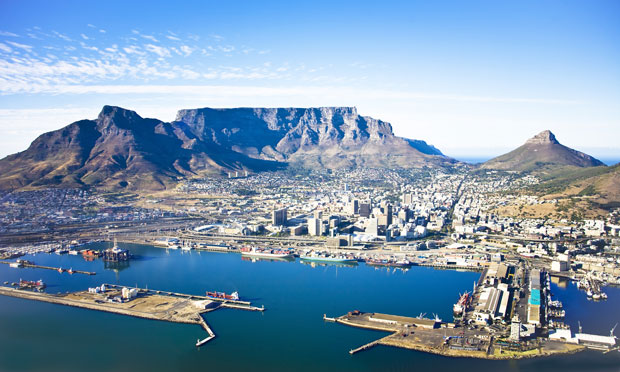
In 2016, Heritage Month is being celebrated under the theme, “Human Treasures and Legends: our Living Heritage”; our effort in asserting our unique African identity.
The aim of this year’s celebrations is to put at the forefront the living human treasures and the living legends, the custodians of the indigenous knowledge for their immense contribution to the arts, culture and heritage landscape.
The celebration of the human treasures and living legends is an integral part of asserting and embracing our African identity.
The living human treasures and legends have a fundamental role to play in society in assisting younger artists to hone their skills, offer mentorship to the youth and guide society as we actively embrace the fullness of our African culture and knowledge in all aspects of our lives.
After 22 years of democracy, it is regrettable that not all South Africans have embraced the fullness of our African culture - a reality brought home recently at a Pretoria school where brave learners exposed racism and prejudice that had been woven into the school’s code of conduct.
It is at times like this, that we remind ourselves of the words of African National Congress President OR Tambo in a Radio Freedom message to the people of South Africa on the 67th Anniversary of the ANC on 8 January 1979.
In that message, President Tambo referred to “the march of the South African people towards a common nationhood, rich in its variety and experience, grounded on the strongest foundations of human equality and non-racialism.”
He went on to say: “Let us in South Africa learn to stop being Bantus, Coloureds, Indians and Whites. Let us be what we are, Africans in Africa. Let those who are committed racists, who came to this continent determined to keep Africans in chains, to be perpetual white masters over blacks - let them persist in their role as foreigners on African soil.”
Given our country’s history, we will not allow racists to decide how the majority of South Africans should conduct themselves; racism belongs in our past and we must put and keep it there with everything we do each day to build a non-racial, inclusive society.
The time for apologies and explanations of racism is over. We must act decisively against racists, and we expect to see condemnation of racism by South Africans of all backgrounds. The fight against racism is not a fight Black South Africans should wage exclusively. Ending racism is everyone’s responsibility.
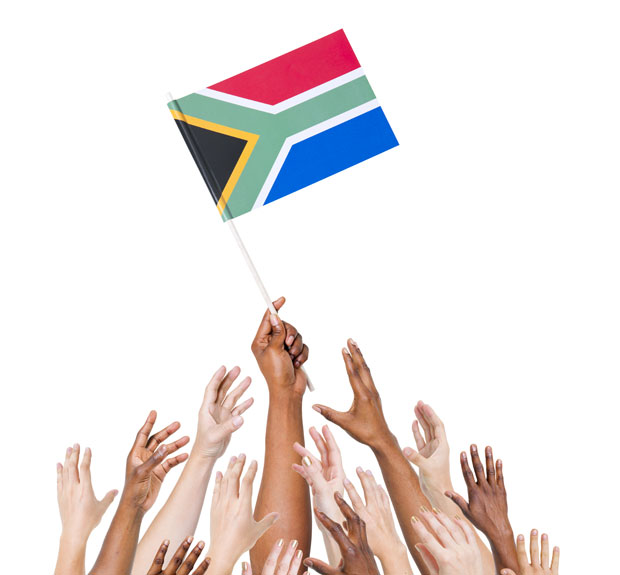 I hope that as South Africans criss-cross our country this month, we will focus on those places and spaces that represent a transformed South Africa. Already, it is encouraging to see how active black entrepreneurs have become in the tourism sector – from the humblest township bed-and-breakfast to the top of a hospitality giant such as the Tsogo Sun group.
I hope that as South Africans criss-cross our country this month, we will focus on those places and spaces that represent a transformed South Africa. Already, it is encouraging to see how active black entrepreneurs have become in the tourism sector – from the humblest township bed-and-breakfast to the top of a hospitality giant such as the Tsogo Sun group.
Just a few days ago, Ma Esther Mahlangu (81) one of our best-known Ndebele artists, was at the centre of a launch of a collaboration between a United States luxury brand and musician John Legend on the #MakeaDifference campaign that will donate half of its profits to the Global Fund for HIV and AIDS.
The product features Ma Esther’s Ndebele patterns and her signature.
This is how we fly our African identity in our hearts and around the world.
As we prepare for Heritage Day on Saturday 24 September, we will embrace our heritage and open our hearts and minds to the ideas our mentors and legends will share with us.
NDP gets a new identity
NDP gets a new identity andileDifferent sectors and groupings should work together in implementing the National Development Plan (NDP) and use the newly launched brand identity of the NDP to move the country forward.
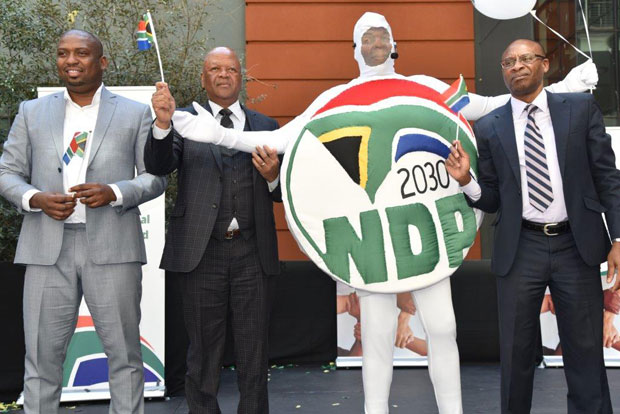 This is according to Minister in the Presidency responsible for Performance, Monitoring and Evaluation Jeff Radebe.
This is according to Minister in the Presidency responsible for Performance, Monitoring and Evaluation Jeff Radebe.
“Each and every one of us as South Africans we have to play our part in implementing the National Development Plan, our Vision 2030 and let us use this NDP Brand Identity together to build a truly democratic, united, non-sexist, non-racial and prosperous South Africa.”
In 2012, government adopted a long-term vision called the NDP. It is aimed at reducing poverty, unemployment, and inequality through the radical transformation of the economy by creating employment opportunities.
Two years after the adoption of the NDP, in 2014, government adopted the Medium Term Strategic Plan (MTSF) 2014-2019 as the first programme to implement the NDP.
The Minister said the work done by various artists encourages South Africans to be a socially cohesive nation.
"We welcome initiatives that are already existing by various sectors who are playing their part such as the Eziko production group that has developed an edu-play on the NDP and its important areas. This edu-play is exemplary of socially cohesive society that strives for a common national identity.”
The Minster acknowledged the role played by entrepreneurs, especially youth entrepreneurs, who have created employment.
“There are also young entrepreneurs from Cape Town who have developed a business idea called Eza Sekasi Fridays which has created decent employment in the townships to champion the NDP.
“This initiative is a stimulus for the statement made by young people who adopted the national youth policy and declared that they do not want a hand out but a hand up.”
Businesses and people in rural areas also have a role to play. For example, a young man from the Eastern Cape created jobs in his community by forming a vegetable growers association.
“During Youth Month, I realised that the NDP is alive when a young man from Mthatha shared his success story of forming vegetable growers association to ensure food security, economic viability and creation of jobs in his community.
The young man through the association is propelling the ideals of the NDP for the smallholder farmer development and agrarian transformation.”
Minister Radebe added that government welcomes the partnership with business and labour to rally behind the NDP in ensuring that there is a collective effort in workplace conflict reduction and improved cooperation between government, organised business and organised labour.
2017 NSFAS applications now open
2017 NSFAS applications now open andileThe National Student Financial Aid Scheme (NSFAS) has made applying for financial assistance easier for students.
 The NSFAS has started the roll-out of the Student Centred Model by opening online applications.
The NSFAS has started the roll-out of the Student Centred Model by opening online applications.
The applications opened in August and will run until 30 November 2016.
Current matric learners, who will need NSFAS financial assistance at universities and Technical Vocational Education and Training (TVET) colleges in 2017, are encouraged to start applying on the NSFAS website: www.nsfas.org.za.
The online system or Student Centred Model is meant to open a direct relationship between NSFAS and its students from registration phase to the completion of their studies.
The system will help reduce delays in payment and processing of new applications for funding every year.
How the system works
- All new applicants (matriculants) must submit their applications directly to NSFAS online (www.nsfas.org.za).
- Students who have never received NSFAS funding must apply online.
- All students who were previously funded by NSFAS and are not funded in 2016 must apply online.
- All students who have signed their Loan Agreement Forms (LAF) or Schedule of Particulars (SOP) for 2016 and are currently receiving NSFAS funding do not have to reapply.
- Funding will be granted provided the funded student meets the NSFAS academic requirements.
All funded NSFAS students must update their information online. To do so they will need to log onto: www.nsfas.org.za and create a MyNSFAS account to verify their details.
Already submitted NSFAS application form to a university or TVET college?
Matriculants who submitted their NSFAS applications before 1 August 2016 to any university or TVET college must not reapply. The institution will send your application directly to NSFAS Head Office.
All paper application forms can be sent to NSFAS Head Office in Cape Town by email to apply@nsfas.org.za or fax 086 644 2822 or by post to: The 2017 Online Applications, NSFAS Loans & Bursaries Department, Private Bag X4, Plumstead, 7801.
Please note the following opening and closing dates:
Grade 12 and previous matriculants: 01 August – 30 November.
Students who were not funded by NSFAS in 2016: 01 September – 30 November.
For further details, applicants can contact NSFAS Offices on 0860 067 327 or visit: www.nsfas.org.za
*Additional information from: www.nsfas.org.za
Sugar tax aims to shrink obesity
Sugar tax aims to shrink obesity andileAs part of ensuring that South Africans are healthy and live longer, National Treasury has proposed a tax on sugary drinks.
 Finance Minister Pravin Gordhan announced the proposed tax during his Budget Vote speech earlier this year, indicating that the new law will come into effect from 1 April 2017.
Finance Minister Pravin Gordhan announced the proposed tax during his Budget Vote speech earlier this year, indicating that the new law will come into effect from 1 April 2017.
The main aim of the tax is to reduce the nation’s sugar intake, reduce the incidence of obesity and ensure that South Africans lead healthy lifestyles.
South Africa is looking to decrease obesity by 10 percent by 2020.
Obesity is a global problem that is contributing to the growing burden of non-communicable disease (NCD) ,including heart disease, diabetes, and some cancers.
According to National Treasury, the problem of obesity has grown over the past 30 years in South Africa, resulting in South Africa being ranked the most obese country in sub-Saharan Africa.
According to the Department of Health, the tax will help reduce the epidemic increase in the incidence of NCDs and oral health problems.
“There is good reason to believe that taxes are an excellent mediator of consumer behaviour,” said Popo Maja, spokesperson for the Department of Health.
He added that without the tax, the consumption of soft drinks was projected to grow by 2.4 percent per year.
This trend will affect poor people predominantly and can lead to a 16 percent increase in obesity by 2017, of which 20 percent will be attributable to sweetened drinks.
He added that sugar also had a negative impact on dental health and related costs.
“While we do not have exact costs in South Africa the treatment of dental diseases is expensive, consuming 5 to 10 percent of health-care budgets in industrialised countries.
Drinking just one sugar-sweetened drink per day increases an adult’s likelihood of being overweight by 27 percent and a child’s by 55 percent.”
The World Health Organisation’s (WHO) guidelines recommend that adults and children reduce their intake of free sugars.
The Commission on Childhood Obesity, set up by the WHO Director-General, recommended that taxes on drinks sweetened with sugar would be an important mechanism to reduce childhood obesity.
“It is important to note that 330ml of soft drink has around eight teaspoons of sugar and therefore just one cold-drink would take the full recommended sugar intake a day. Many other foods and sauces added to food also contain sugar,” Maja said.
He added that such a tax will send a clear message to the public and raise awareness about sugar so that consumers are equipped to make healthy choices.
For more information on the proposed sugar tax visit: www.treasury.gov.za
Early birth registration improves service delivery
Early birth registration improves service delivery andileLimpopo Health MEC Dr Phophi Ramathuba has urged parents to register their babies at birth with the Department of Home Affairs.
This will help government in its planning so it can better deliver services to communities.
MEC Ramathuba was speaking during a visit to Seshego Hospital in Polokwane. The purpose of the visit was to highlight the importance of early registration of birth.
“This is a very important programme for us because we will plan knowing the exact population we are servicing. It will improve service delivery. We want to vaccinate [children] as prevention works better,” she said.
She said early registration of birth is important because it ensures the credibility of the South African population register. She said it is difficult for various departments to render social services, educational opportunities, health services and other services that benefit children if they do not have birth certificatess.
The Department of Health said often children without birth certificates are unjustly treated and vulnerable to risks such as trafficking, child labour, child marriage, illegal adoption, sexual exploitation and, in some instances, recruitment into armed forces.
The MEC said early registration will also help the department to investigate which clinics did not vaccinate children as well as mothers who did not bring their children for vaccination.
To curb non-registration of babies in Limpopo, the MEC said Home Affairs officials are allocated space in Seshego Hospital and other health facilities to register babies online immediately after birth and to issue an unabridged birth certificate.
The Department of Home Affairs said Limpopo has 47 health facilities that are connected online out of 391 health facilities that are connected nationally.
“There are about 40 Home Affairs offices that register births [in the province],” said the MEC.
This makes it easy for mothers, who qualify for their children to get social grants, to apply sooner, as South African Social Security Agency (Sassa) officers are also deployed at hospitals.
Registration of child birth within 30 days is free and a certificate is available on the date of registration. However, fees are charged in the case of late registration of birth.
Challenges to early birth registration
Factors that impact on birth registration within 30 days include:
- Delays in registration of children who have been separated from or who have lost their parents
- Religious and cultural beliefs and practices on the naming of the child
- Home births and inadequate statistics and information about them
- Accessibility of children living in remote rural areas and on farms
- Accessibility of border-lying areas and informal settlements
- Children born to non-South African citizens who are in the country illegally.
Birth, Marriages and Death Registrations Director in the Limpopo Home Affairs Department, Dr Aaron Ramodumo, said upon registration, mothers who are married can give the particulars of the father of the baby, which will be captured on the system.
However, if they are not married, they can provide the father’s information with his consent.
Dr Ramodumo reiterated that it is important to create a credible National Population Register with birth registrations, from cradle to grave.
“We cannot register you at death if we did not register you at birth,” said Dr Ramodumo.
Municipal ward committees: What you need to know
Municipal ward committees: What you need to know JoyLocal Government
South Africa recently held free and fair Local Government Elections. Now the focus is on another important aspect of the local government system in South Africa: the formation of ward committees.
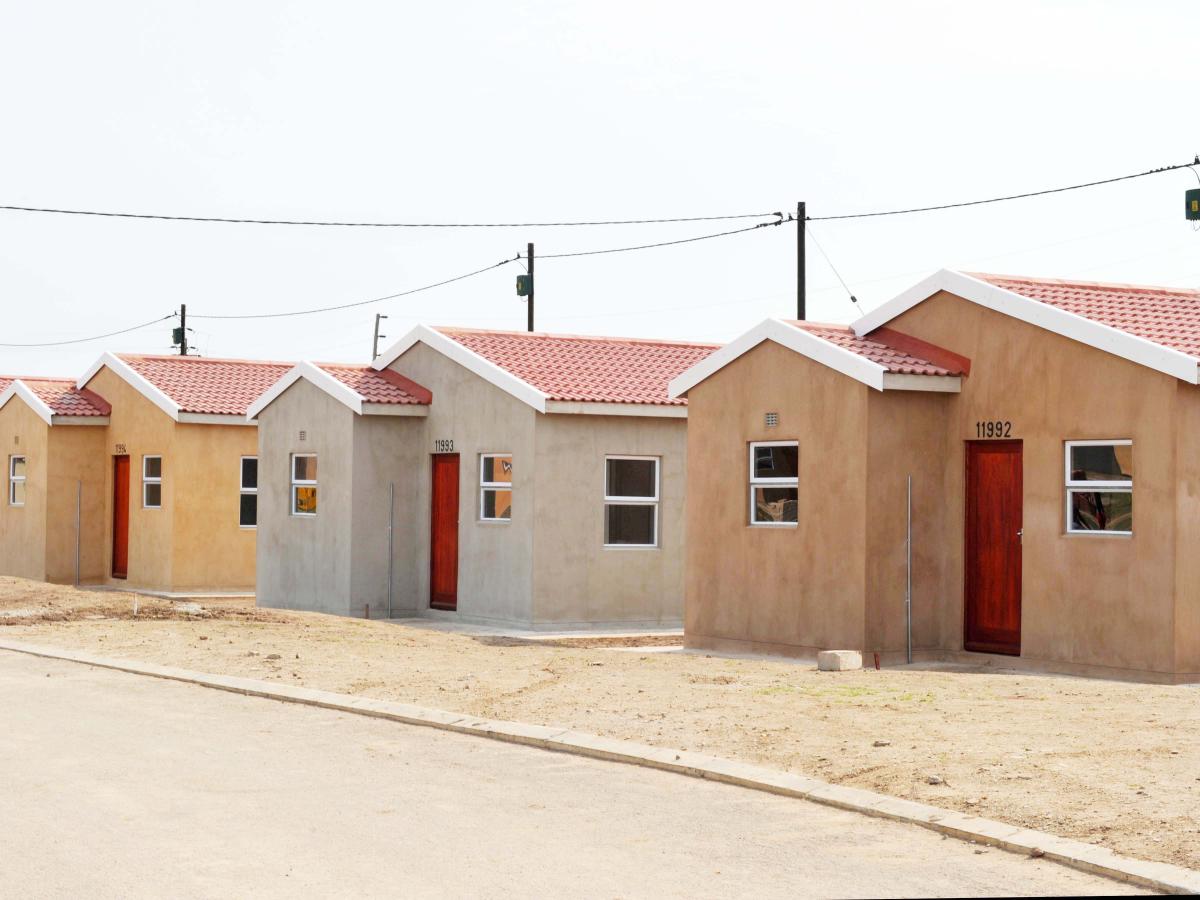 Vuk’uzenzele looks at the role and functions of ward committees since the system was introduced in 2005.
Vuk’uzenzele looks at the role and functions of ward committees since the system was introduced in 2005.
According to legislation, the first meeting of the newly elected council must take place within 14 days after the election results are gazetted.
What are ward committees?
Ward committees are made up of representatives of a particular ward.
They are made up of members who represent various interests within the ward and are chaired by the ward councillor.
They are meant to be an institutionalised channel of communication and interaction between communities and municipalities.
Ward committees give community members the opportunity to express their needs, their opinions on issues that affect their lives and to have them heard at municipal level via the ward councillor.
Wards committees are advisory bodies created within the sphere of civil society to assist the ward councillor in carrying out his or her mandate in the most democratic manner possible.
Why are ward committees important?
Ward committees are important to the local government system as they are the link between the councillor and the community.
The ward committee system is also said to play an important role in giving meaning to the notion of “the people shall govern”. This is because local government is regarded as the level of government closest to the people and ward committees are just one way to ensure that citizens give input to the decisions that local councils make.
The South African Local Government Association (Salga), which is the sole representative of all municipalities, says ward committees are also important in promoting relations between ward councillors and key stakeholders at ward level, such as traditional councils and community development workers.
Election of ward committees
Salga has developed a code of conduct for ward committee members, which is available at all municipalities. However, municipal councils must make the rules regarding the election of ward committee members, including how often meetings take place and the closure of ward committees.
The Speaker, who is appointed by the majority of council members, calls a meeting in the ward for the election of a ward committee.
Nominations shall be open for 10 but not more than 15 nominees.
What are the functions of ward committees?
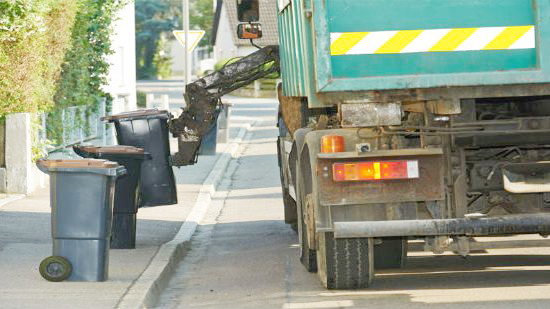 According to the Department of Cooperative Governance and Traditional Affairs, a ward committee may make recommendations on any matter affecting its ward to the ward councillor, or through the ward councillor to the municipal council, the executive committee or support committee.
According to the Department of Cooperative Governance and Traditional Affairs, a ward committee may make recommendations on any matter affecting its ward to the ward councillor, or through the ward councillor to the municipal council, the executive committee or support committee.
The ward committee will be regarded as the statutory structure recognised by the municipal council as its consultative body and communication channel on matters affecting the ward, including, but not limited to:
- representing the community in the compilation and implementation of the Integrated Development Plan (IDP)
- ensuring constructive and harmonious interaction between the municipality and the community
- attending to all matters that affect and benefit the community
- acting in the best interest of the community, and ensuring active participation of the community in the municipality’s budgetary process.
The role played by ward committees
Ward committees have an important role to play in bridging the gap between the municipality, its council and the community. Some of the objectives of ward committees are to:
- create formal unbiased communication channels and co-operative partnerships between the municipality and the community within a ward
- ensure contact between the municipality and the community through the use and payment of services
- create harmonious relationships between the residents of a ward, ward councillor, geographically diverse community and the municipality
- facilitate public participation in the process of managing the development, review, and implementation of the municipality’s IDP
- act as an advisory body on council policies and matters affecting communities in the ward
- monitor the implementation of ward plans, programmes and ward discretionary funds (note that control of funds and implementation rests with council)
- coordinate ward programmes.
Terms of office for ward committees
The terms of office of ward committees are aligned to those of municipal councils and the municipality must, as soon as possible after the results of the elections have been declared, arrange ward meetings so that the interest groups in the ward can be identified.Thereafter ward committees are elected according to the system applicable in each respective municipality.
Minister wishes new councillors well
Minister wishes new councillors well JoyLocal Government
Cooperative Governance and Traditional Affairs (Cogta) Minister Des van Rooyen has wished new councillors well in their new responsibilities.
“In welcoming you all democratically elected councillors, I urge you to remain true to the democratic tenants, principles and ethos of the Constitution of the Republic of South Africa.
“I urge you to remain true to the mandate of this important sphere of our government, as established in terms of our Constitution as a distinctive sphere of government, interdependent and interrelated with national and provincial spheres,” said Minister Van Rooyen.
He also expressed confidence in the councillors’ ability to carry out their duties with the best interests of communities at heart.
“We urge all the 257 municipalities to ensure that the fourth term [of democratic local government] is guided by the vision of a democratic and developmental local government in which municipalities fulfil their constitutional obligations,” the Minister said.
All councillors will go through an induction programme.
The induction programme will enable councillors to quickly become familiar with how the council works, the rules under which a council operates and the complexities of the role.
South Africa and Mozambique strengthen ties
South Africa and Mozambique strengthen ties JoyHeritage Month
There is an old Setswana proverb that says “matlo go shwa mabapi”, which literally means when one house burns, the next house will also burn.
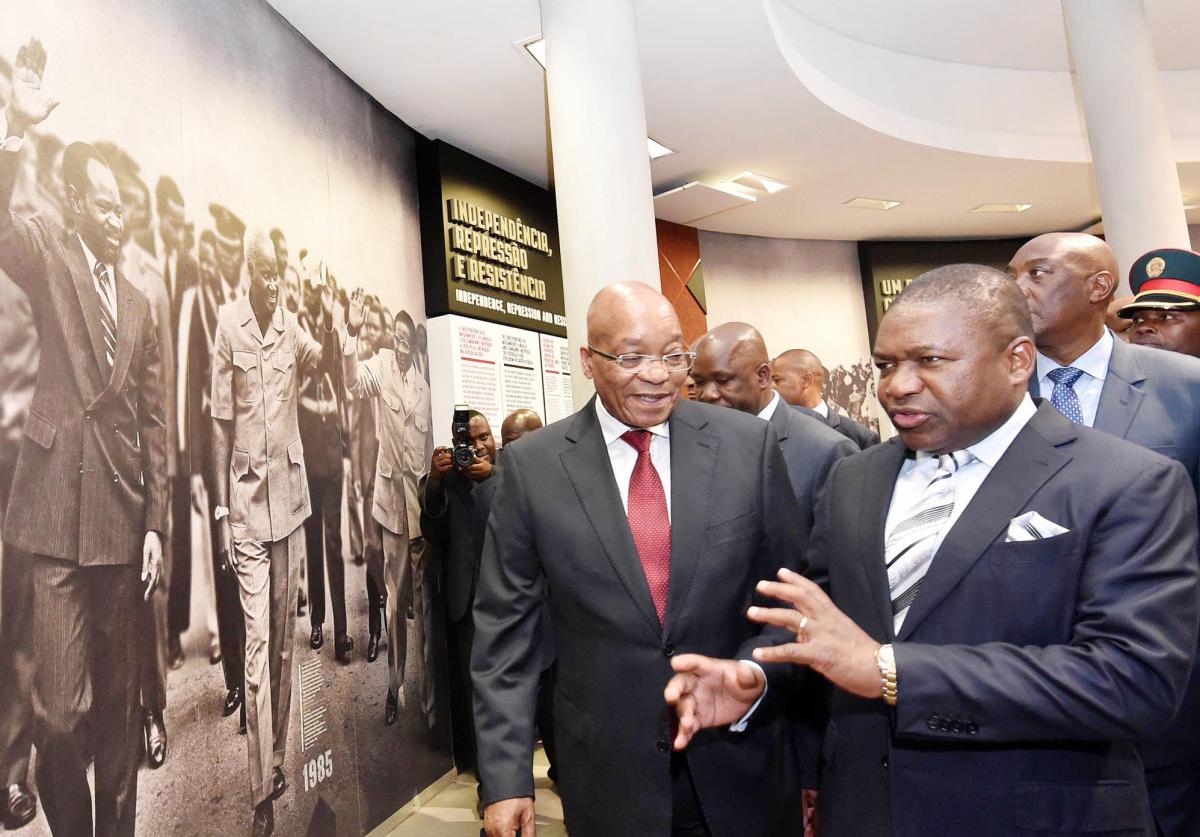 Mozambique and South Africa have always had a close relationship with the countries having trade, political, cultural and social ties. Both countries also fought to attain democracy.
Mozambique and South Africa have always had a close relationship with the countries having trade, political, cultural and social ties. Both countries also fought to attain democracy.
Mozambique is one of South Africa’s top five trading partners in the region. In 2014, South African exports to Mozambique amounted to R32.6 billion, while imports from Mozambique to South Africa totalled R11.3 billion.
In 2015, bilateral trade between the two countries amounted to R39.9 billion. South African exports to Mozambique totalled of R29.5 billion, while Mozambican imports to South Africa amounted to R10.4 million.
“International solidarity is not an act of charity: It is an act of unity between allies fighting on different terrains toward the same objective. The foremost of these objectives is to aid the development of humanity to the highest level possible.” Samora Machel.
The border between the two countries passes through one of Africa’s largest game reserves, the Kruger National Park.
In addition, Xitsonga is spoken in Mozambique and parts of Limpopo.
Mozambique was a Portuguese colony until 1974 when the Front for the Liberation of Mozambique (Frelimo) overthrew the government.
A new political era followed with Samora Machel becoming the country’s first black president in 1975. He is often likened to former President Nelson Mandela because he too fought an oppressive colonial regime.
During apartheid, President Machel helped most of the South African Development Community (SADC) countries fight their colonial rulers.
President Machel encouraged independent states and many leaders to help free other countries that had not gained their independence at the time.
Mozambicans understood that their liberation was incomplete unless the whole of Southern Africa was liberated.
President Machel’s assistance for the freedom fighters and opposition to the apartheid government made him a target of apartheid security agents.
On 19 October 1986, President Machel and his delegation of ministers and senior government officials were travelling from a Frontline State summit in Zambia when his presidential Tupolev Tu-134 aircraft crashed in the Lebombo Mountains on the border of Mozambique and South Africa.
In 1998, 12 years after President Machel’s death South Africa, under the Truth and Reconciliation Commission (TRC), special investigation into his death was launched. It did not reveal any new evidence.
In 2006 the South African government announced that it would try to investigate the plane crash, which remains one of the great mysteries of the apartheid era.
During the same year, the South African government opened a community library at Mbuzini in Mpumalanga, known as the Mbuzini Samora Machel Public Library. The opening commemorated the 20th anniversary of Machel’s death and acknowledged the assistance Mozambicans gave South Africa’s freedom fighters.
As the two countries mark the 30th anniversary of his death, both governments will work together to commemorate the death Mozambique’s first president.
President Machel supported South African liberation fighters in their struggle against apartheid and allowed them to operate within Mozambique.
Such friendship and support meant that South Africa’s struggle against apartheid was a collective effort.
Remembering the life of Samora Machel
Remembering the life of Samora Machel JoyIn celebration of the relationship between South Africa and Mozambique the two countries will mark the 30th anniversary of the death of former Mozambican President Samora Machel.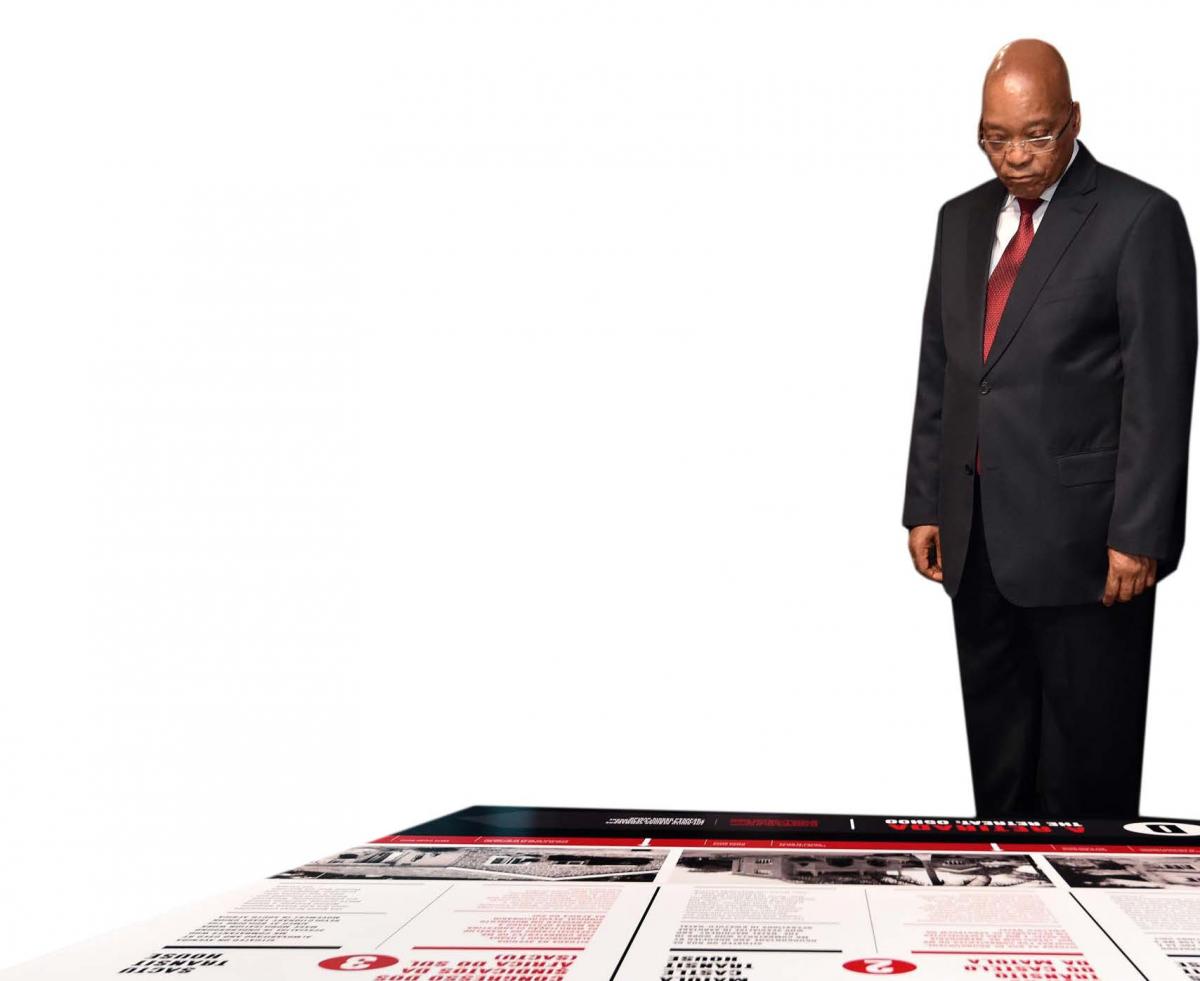
On the day, the two countries will pay tribute to all the heroes and heroines who died in a mysterious aircraft accident and remember their contribution to South Africa’s struggle for freedom.
The event will be held at the crash site in Mbuzini, Mpumalanga on 19 October 2016.
South Africa’s President Jacob Zuma and Mozambique’s President Filipe Nyusi are expected to address the event and lay wreaths at the site.
Government officials from both Mozambique and South Africa are expected to attend the ceremony.
Township economies get a boost
Township economies get a boost JoyGovernment has pledged more support for township economies.
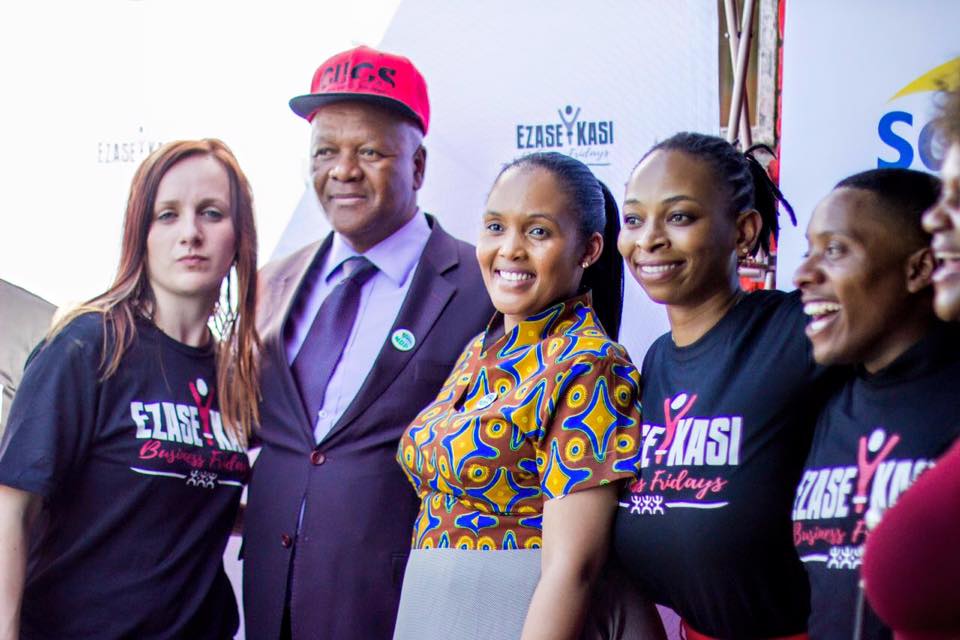 Minister in the Presidency responsible for Planning, Monitoring and Evaluation, Jeff Radebe, recently launched EZASE-KASI Business Fridays. It is a campaign aimed at supporting township economies.
Minister in the Presidency responsible for Planning, Monitoring and Evaluation, Jeff Radebe, recently launched EZASE-KASI Business Fridays. It is a campaign aimed at supporting township economies.
EZASE-KASI, meaning ‘from the township’, aims to boost township economies nationwide.
Speaking at the launch in Cape Town, the Minister said the new programme, which is the brainchild of local entrepreneur Siyanda Mtulu, is an initiative aimed at driving the city’s economic activity towards townships every Friday.
“When we talk about Vision 2030, it does not depend only on government and the private sector.
“What I like about this initiative is that it brings big business and links it to our business people in our townships so that it can be able to boost those economies.
“I’m looking forward to seeing this initiative every Friday, not only here in Cape Town but throughout the Republic of South Africa,” the Minister said.
The Minister said EZASE-KASI Business Fridays will be co-branded with the recently launched National Development Plan (NDP) Brand Identity to mobilise and actively engage citizens in the NDP and township economies.
Tourism Deputy Minister Tokozile Xasa, who also attended the launch, said this was one of the best initiatives to boost economic growth in townships.
She said there is also potential for infrastructure development, skills development and nurturing the kind of support that is needed to help township businesses flourish.
“There are lot of … indigenous skills around crafting. There’s everything that tourists are looking for when they come to South Africa,” she said.
The programme is expected to be rolled out across the country to support township businesses.
Mtulu urged South Africans to wear items produced by townships, eat lunch in the townships as well as participate in corporate township tours and buy goods from township businesses.
“This would benefit ordinary South Africans by creating jobs and it is also a chance for big companies to support and do business with Broad-Based Black Economic Empowerment companies,” he said.
Short-term insurance firm Santam is backing the initiative.
Santam’s John Lomberg said the firm would train people, targeting 600 to 800 entrepreneurs across the country.
Claiming maternity benefits
Claiming maternity benefits JoyLearning that you are pregnant is often the most exciting yet life-changing experience in a woman’s life. This can also be a daunting and confusing experience for most women and may raise concern about the possible loss of a regular income.
 The Unemployment Insurance Fund (UIF) maternity benefit fund allows pregnant women to take four consecutive months of maternity leave and affords financial relief over a short period of time to care for their newborn babies.
The Unemployment Insurance Fund (UIF) maternity benefit fund allows pregnant women to take four consecutive months of maternity leave and affords financial relief over a short period of time to care for their newborn babies.
To apply, new mothers can go to their nearest labour centre at the start of their maternity leave.
The window period for approval takes approximately six to eight weeks and payments will only be made once the birth date is confirmed.
If new mothers want to claim maternity benefits they must use the following steps:
Step 1: Get the documents ready
Before new mothers can claim, they must get the following documents ready:
• ID or passport
• Form UI-2.8 for banking details
• Form UI-2.7
• Form UI-2.3 (application form)
• Medical certificate from a doctor or birth certificate of the baby
• Form UI-4 (follow-up form)
Step 2: Go to the nearest labour centre
Pregnant women must go to the nearest labour centre themselves and hand in the documents. If they are too ill, they can organise for someone else to go in their place. Staff at the labour centre will assist them with all the processes and give them more information.
Step 3: Follow all the instructions of the staff at the labour centre
Staff at the labour centre may ask pregnant women to go to the doctor again or to visit the labour centre at certain times. Applicants should do what is asked of them, or they may not be able to claim.
How long can I claim?
Women can claim for 17 weeks.
Note: Women who miscarry in the third trimester or have a stillborn child can claim for six weeks.
How will I be paid?
Benefit payments will be paid into your bank account.
Will I be taxed?
No tax is payable on the benefits.
What should I do if I get overpayment?
If you get more money than you should, you must pay back the extra money.
Important
A person cannot claim for maternity benefits if they receive money from the Compensation Fund for an occupational injury or disease; or any other unemployment fund; or have been suspended from claiming because of fraud.
For more information contact the call centre on: 0800 843 843/0800 or visit: www.labour.gov.za
Top female farmers honoured
Top female farmers honoured JoyThe Department of Agriculture, Forestry and Fisheries (DAFF) recently honoured the country’s best female farmers.
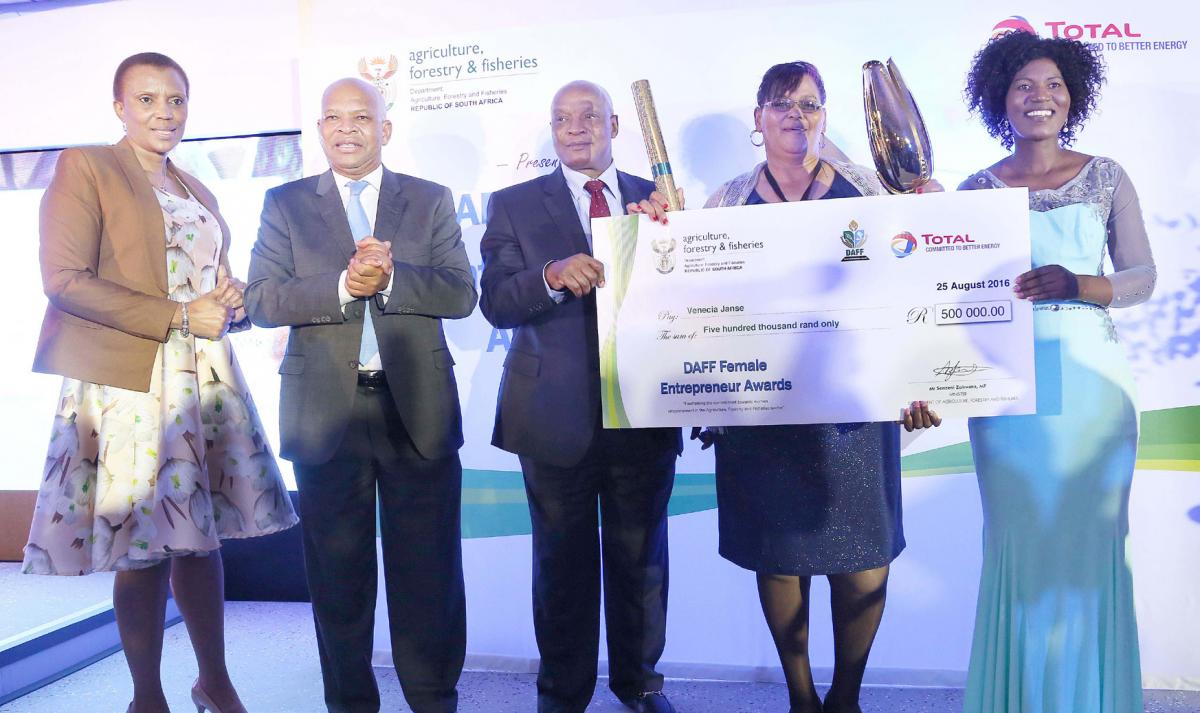
The 2016 DAFF Female Entrepreneur Awards acknowledged their contribution to the agricultural sector and food security.
Established 17 years ago, the awards are aimed at encouraging and increasing the participation of women, youth and people with disabilities in the agricultural sector.
The awards are a culmination of provincial awards ceremonies where winners from each province compete against each other in different categories.
Minister of Agriculture, Forestry and Fisheries Senzeni Zokwana said the participation of women in the agricultural sector was important for government to ensure that there is food security.
“The participation of women in the mainstream of the sector and the economy requires aggressive attention to reduce food security threats.”
He added that the department will continue to recognise the contribution made by women and encourage more women to join the agricultural sector.
During the awards top female farmers received prize money and sponsorships that include, among others, study tours to Kenya and information about farming.
Winners from the provincial award ceremonies competed in nine categories where each winner was awarded a trophy and prize money ranging from R100 000 to R500 000.
Lindela Elizabeth Mabuya from the Western Cape was named Best Female Worker and received R100 000 in prize money.
Nthabiseng Kgobokoe of North West was named Best Subsistence Producer and walked away with
R150 000, a tablet and
a study tour to Kenya.
Mpumalanga farmer Makhosazane Sambo was named the Top Entrepreneurial Small Holder Farmer. She won R250 000, a tablet and a study tour to Kenya.
In the fourth category, Mabel Motlhele from Northern Cape won the Top Entrepreneur Processing award. She walked away with R150 000 and a tablet loaded with information on agriculture.
In the category Top Entrepreneurial Commercial, Western Cape-born Caroline de Villiers won the award and received R250 000, a tablet and fertiliser worth R40 000 from Omnia.
Venecia Janse from the Eastern Cape was Top Entrepreneur Export Market and won R250 000, a tablet and fertiliser worth R40 000 from Omnia.
Candice Muriel Bostander from the Northern Cape won the Ministerial Award: Young Female Entrepreneur of the Year and pocketed R100 000, while Philisa Fadana from the Eastern Cape won the Ministerial Award and R100 000.
The main winner of the night was 54-year-old Venecia Janse, an apple and pear farmer from the Eastern Cape. Janse won a trophy and
R500 000.
For more information on the Daff Female Entrepreneur Awards visit: www.daff.gov.za
EC farmer is on top of her game
EC farmer is on top of her game JoyVenecia Janse’s love and passion for farming started at a young age. As a teenager she worked at different farms as a general worker and as the years went by she rose up the ranks to become a supervisor and ultimately a farm owner.
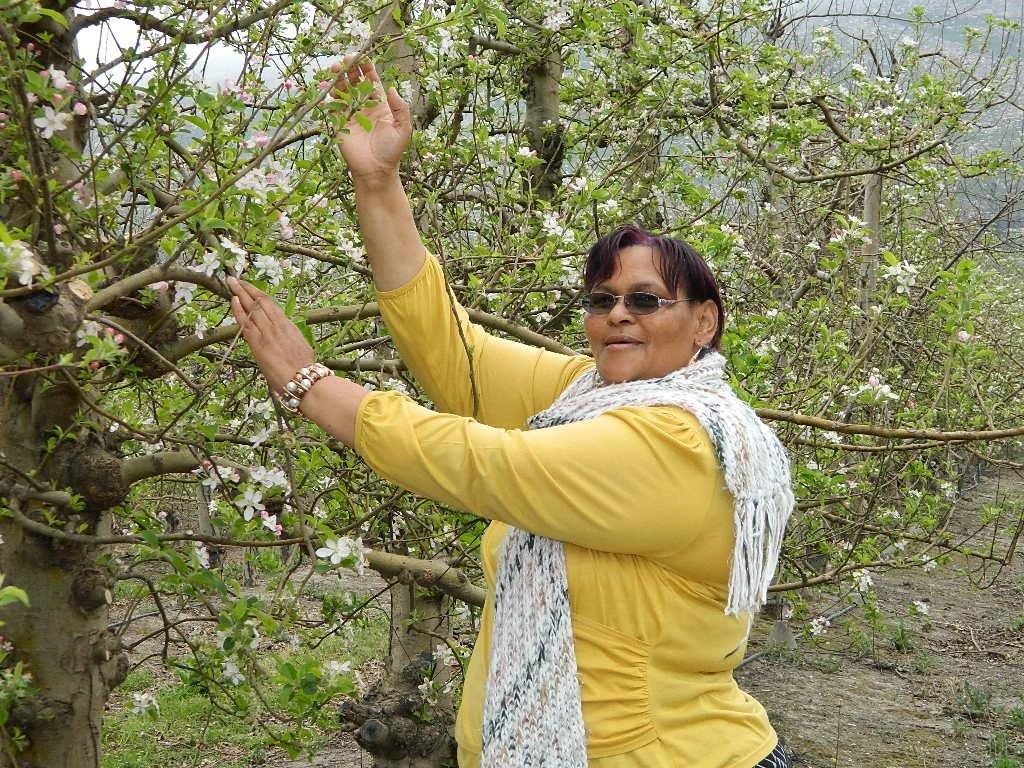 During the many years she worked on farms, she never imagined that she would win awards for her work.
During the many years she worked on farms, she never imagined that she would win awards for her work.
“The secret to my success has been discipline and doing things on time because in farming timing is important. I also have a passion for my work and I put my heart and soul into everything I do,” she said after beating 50 other competitors in the 2016 Department of Agriculture, Forestry and Fisheries Female Entrepreneur Awards.
Her experience, commitment and love of farming paid off as she is was named the overall winner at the awards.
This Eastern Cape pear and apple farmer, who was also named top entrepreneur export markets, specialises in producing Pink Lady, Royal Gala, Golden, Granny Smith and Top Red apples. On the pear side, she specialises in the Forrelle and Rosemary varieties.
She said the journey to becoming the best has been filled with challenges and managing a farm as big as hers sometimes takes its toll on her. Janse’s 300 hectare farm, Oudrif Trust No 2, lies 26km west of Louterwater under the Koukamma Local Municipality in the Eastern Cape.
“Being in charge of the farm is very difficult at times because you don’t only manage the farm but you also manage people who work on the farm”.
Despite the challenges, Janse sees a bright future for her farm and her workers.
She employs 44 permanent workers and 88 seasonal workers.
Janse said she would use her prize money to buy farm implements.
“I’m going to buy tractors and sprayers and with the remaining money I will buy trees so that we can increase our output to help the farm grow.”
She said in the next five years she would like to see her farm growing to a point where she can employ more people on a permanent basis.
Tourism boosts SA economy
Tourism boosts SA economy andileTourism Month
Deputy Minister of Tourism Tokozile Xasa says tourism has a major role to play in growing the country’s economy.
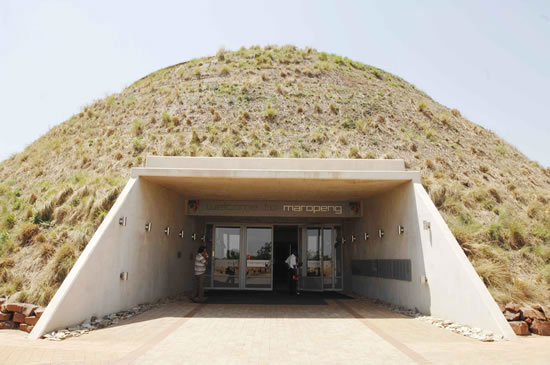 “Tourism is deemed to be a major player in its contribution to the economy and is recognised as a job creation sector as it is, by [and] large, labour intensive.”
“Tourism is deemed to be a major player in its contribution to the economy and is recognised as a job creation sector as it is, by [and] large, labour intensive.”
The Deputy Minister said the department is committed to boosting domestic tourism over the next decade as it has the potential to increase the tourism economy. This will avoid excessive dependency on international arrivals.
“This is, however, a long-term objective as many factors affect the progressive development of domestic tourism including the affordability and cost of touring the country, disposable income to spend on holidays, unemployment and many other factors.”
By increasing tourism growth over the next decade the country can expect to see local economies benefiting from tourism spending in their areas, which should support jobs in local tourism establishments, profit margins and sustainability, points out the Deputy Minister.
More opportunities for youth
More opportunities for youth andileTourism Month
The Department of Tourism has launched a number initiatives aimed at getting the youth involved in the tourism sector.
The Tourism Buddies programme is an experiential hospitality training programme that targets unemployed youth to enable them to acquire skills and gain work experience to enhance employability in the hospitality and tourism sector.
Deputy Minister Tokozile Xasa says during the 2015/16 financial year, the department enrolled 2 950 learners for the National Certificate Food and Beverages NQF Level 4; and National Certificate Accommodation Services NQF Level 2.
The department also runs the sommelier programme that sees young people trained in wine service.
“In the 2015/16 financial year, 270 learners were enrolled in the Wine Service Training Programme. Of these 243 learners graduated and 187 were women,” said Deputy Minister Xasa. She said the Wine Service Training Programme is implemented under the department’s social responsibility initiative.
“The programme responds to the main objectives of the National Skills Development Strategy III, which encourages and actively supports the integration of workplace training, with theoretical training and places great emphasis on relevance, quality and sustainability of skills training programmes to ensure that they impact positively on poverty reduction and inequality.”
South Africa does not have many qualified sommeliers and it is considered a very scarce skill.
“This training involves pairing food and wine. The aim and objective of this programme is to skill the unemployed youth to make sure they are employable within the hospitality sector.”
The department also runs the National Youth Chefs Training Programme, which ensures world-class service standards, promotes South African indigenous cuisine and produces globally competitive chefs who are able to compete with the best in the world.
“In the 2015/16 financial year, the department enrolled 577 learners for the Professional Cookery qualification, some were specialising in pastry. There will be 470 learners graduating and 405 of them are women.”
DID YOU KNOW?
More than a million tourists arrived in the country in the first quarter of 2016.
Gogos tour SA
Gogos tour SA andileTourism Month
Tourism South Africa has taken 1 000 senior citizens to various tourist destinations as part of Tourism Month.
During Tourism Month, which is traditionally in September, the focus is showcasing the beauty of South Africa.
This year’s theme is “Tourism for All.”
Deputy Minister of Tourism Tokozile Xasa said the tour was as a result of a partnership between Tourism South Africa, an entity of her department, and a non-profit organisation called Gogo on Tour, which is a free travel club for the elderly.
“The purpose of this partnership is to align to bigger strategy of building a holiday culture. We want to use this activation as an opportunity to capture what Tourism for All means to the elderly.
This gives us an opportunity to highlight the affordability and accessibility of domestic travel. It will target the majority of adult South Africans who have not taken a holiday trip within the country and help build the culture of travel.” 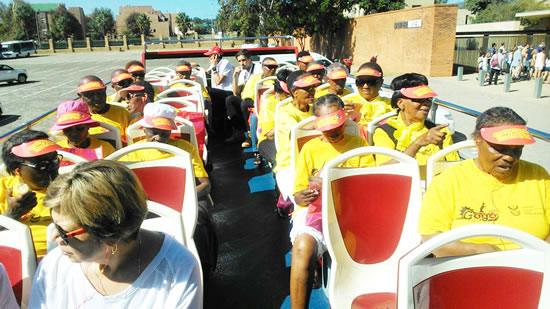
Thokozile Matjokane (70) started Gogo on Tour in 2012 after her two siblings passed away.
“The plan was once Thokozile and her brother and sister had retired they would travel and see the world. Before this dream came true the siblings passed away,” said Khensani Matjokane, Thokozile’s daughter and also Marketing Manager for Gogo on Tour.
“I decided to quit my business and help my mother realise her dream because it’s important that as South Africans we are aware of our country and its beauty.”
Gogo on Tour, which relies on sponsorship, offers trips to people aged 60 years and older.
“We have been to so many different places such as the Kruger National Park, State Theatre and rides on the Gautrain so that they get to experience the country.”
Matjokane said some of the grannies who go on the tours have not seen South Africa since 1994 and observed how much the country has changed.
She added that she was grateful for the partnership they had with Tourism South Africa as it would make a difference to the senior citizens.
High scam alert to suppliers and service providers of Dept of Health
High scam alert to suppliers and service providers of Dept of Health andileIt has come to the attention of the National Department of Health (NDoH) that there are certain unscrupulous companies and individuals disguised as representatives of the Department who are defrauding unsuspecting businesses.
The Department is inundated with calls on a daily basis from people who have been defrauded by millions of rand. People have lost their businesses, pensions and investments. The scam involves the fraudsters using departmental letterheads to send out fake tenders to companies and requests to supply equipment and goods.
Please note that, on these letters, the contact person’s name and telephone number is not the same as that of the NDoH in Pretoria. When searching the address on the Internet of the company that has sent the fake tender document, it is found that it does not exist. The banking details are in a private name and not a company name. Government will never ask you to deposit any funds for any business transaction.
The NDoH has alerted the relevant law enforcement authorities to investigate this scam, to protect legitimate businesses and well as the name of the Department. Should you suspect that you are a victim of a scam, you must urgently contact the police and inform the National Department of Health. Examples of e-mails these fraudsters use are:tenders@doh.za.orgdoh@treasury-gov.org.zaghd@gautenghealth-gov.org.zahealth@mphumalang-gov.org.zaNDOH@nationalhealth gov.org.zatebogomambolo@heaths-gov.org.zaThatomolope@dh.gov.co.za
Their phone numbers are:+27 (0)12 743-5358+27 (0)12 743-6854+27 (0)12 755-3923 When the numbers above are called, a person picks up and says: “Department of Health, how can we help you?”. Alternatively, the call is diverted to a mobile number voicemail (063 354 8800).
Government e-mails DO NOT have “org” in their addresses. All these fraudsters also use the same or very similar telephone numbers. Even though such numbers, with the “012” area code, seem to be landlines, they are in fact not fixed to any property. The National Department of Health will never send you an e-mail asking you to supply equipment and goods without a purchase/order number. The National Department of Health does not procure goods for another level of government. It will never ask you to deposit money into a private account. The Department will not be liable for actions that result in companies or individuals being victims of such scams.
Should you suspect that you are a victim of this scam, please report the matter to the SAPSOR verify the legitimacy of the request with National Department Health on (012) 395-9591or majap@health.gov.za
Jobs: Department of Women
Jobs: Department of Women andileInterested applicants who meet the post requirements and security vetting criteria are invited to apply for the following positions:
Deputy Director-General: Social Transformation and Economic Empowerment
Reference: DOW/05/2016
Salary package: R1,299,501 per annum (salary level 15)
National Office, Pretoria
Duties: to facilitate and promote the attainment of women’s socio-economic empowerment and gender equality through intervention mechanisms for gender mainstreaming.
Requirements: post-graduate degree in Social Sciences, Development Sciences/ Economics or relevant NQF 8 qualification PLUS 15 years’ experience of which 8 years were at senior management level.
Chief Financial Officer
Reference: DOW/06/2016
Salary package: R1,068,564 per annum negotiable (salary level 14)
National Office, Pretoria
Duties: to plan, direct and coordinate the financial operations of the Department in consultation with the Director-General and senior managers in terms of the Public Finance Management Act and Treasury Regulations.
Requirements: Technically trained and proficient, appropriate postgraduate degree in Financial Management or relevant NQF 8 qualification PLUS at least 5 year’s senior management and leadership experience in a financial management environment PLUS proven experience in strategic financial management, financial accounting, planning and budgeting. Other than accounting, the post holder must be a professional with strong management skills to provide leadership to the strategic planning and budget processes.
Chief Director: Gender Sector Information and Knowledge Management
Reference: DOW/07/2016
Salary package: R1,068,564 per annum (salary level 14)
National Office, Pretoria
Duties: to ensure the effective management of gender sector information and knowledge related to social transformation and economic empowerment of women and gender equality.
Requirements: appropriate NQF 7 qualification in Information and Knowledge Management PLUS at least 5 year’s senior management experience PLUS 10 year’s proven experience in the management of information and knowledge management across various platforms.
Enquiries:
Mr Mbhazima Shiviti (012) 359 0262
Full details of the advertisements and the application process are available from the Department’s website www.women.gov.za or DPSA Vacancy Circular www.dpsa,gov.za.
Closing Date: 27 September 2016.
Bursaries: Agriculture, Forestry and Fisheries 2017
Bursaries: Agriculture, Forestry and Fisheries 2017 andileThe Department of Agriculture, Forestry and Fisheries (DAFF) intends to award comprehensive bursaries to qualifying applicants pursuing and/or intending to further their studies in a career in the agricultural, forestry and fisheries sectors for the 2017 academic year. The bursary will cover tuition, accommodation, books, meals and monthly allowance. The bursary awards target the previously disadvantaged and impoverished persons from poverty-stricken and rural communities. People with disabilities are encouraged to apply.
| Fields of studies | Minimum requirements (National Senior Certificate) |
| 1. B.Sc. Bioresource Engineering (Agricultural Engineering) 2. Bachelor of Veterinary Science (B.V.Sc.) |
Physical Science 6 (70-79) |
| 3. B.Sc. Viticulture and Oenology 4. B.Sc. Plant Pathology 5. B.Sc. Entomology 6. B.Sc. Forestry and Wood Science 7. B.Sc. Marine Biology 8. B.Sc. Oceanography and Marine Biology 9. B.Sc. Ichthyology specialising in Aquaculture |
Mathematics and Physical Science 5 (60-69) |
| 10. National Diploma: Food Technology 11. National Diploma: Forestry 12. National Diploma: Marine Science |
Mathematics and Physical Science 4 (50-59) |
| 13. Postgraduate studies (B.Tech, B.Sc., Hons., M.Tech., M.Sc., D.Tech. and Ph.D.) in different agricultural, forestry and fisheries fields of study relating to DAFF priority research projects. Successful candidates will be appointed as interns and placed with the relevant industry/research institution/institution of higher learning as young professionals. Successful candidates will also be allocated a mentor and will receive a monthly allowance from the department. | |
NOTES
1. It is worth noting that certain fields of study are only available at certain institutions of higher learning:
- B.Sc. Bioresource Engineering (Agricultural Engineering): University of KwaZulu-Natal
- Bachelor of Veterinary Science (B.V.Sc.): University of Pretoria
- B.Sc. Viticulture and Oenology: University of Stellenbosch
- B.Sc. Forestry and Wood Science: University of Stellenbosch
- B.Sc. Oceanography and Marine Biology: University of Cape Town
- B.Sc. Ichthyology specialising in Aquaculture: Rhodes University
- National Diploma: Forestry: Nelson Mandela Metropolitan University
- National Diploma: Marine Science: Cape Peninsula University of Technology
2. Applicants must be South African citizens.
3. Applicants must complete the relevant bursary application forms available from the website address: www.daff.gov.za (Click the following: Food Security and Agrarian Reform Branch then Sector Education and Training and then Careers).
4. Applicants who apply for fields of study that are not listed above will not be considered.
5. Please note that communication will be limited to successful applicants only. If you have not received any communication from the department by15 January 2017, after the National Bursary Committee has finalised the selection process, consider your application unsuccessful.
6. All completed bursary application forms together with certified copies of ID and certificates/performance results should be sent to the following address:
The Director: Ms Amanda Shokane
Directorate: Sector Education and Training
Department of Agriculture, Forestry and Fisheries
Private Bag X250
Pretoria
0001
For further enquiries please contact
Mr Frans Setseba: 012 319 7848
Mr Vusimuzi Mngomezulu: 012 319 7923
Ms Boitumelo Maleka: 012 319 7024
NB. (i) The Department of Agriculture, Forestry and Fisheries reserves the right to determine the total number of bursary allocations for the academic year based on the total budget available.
(ii) The National Bursary Committee will make use of the Bursary Scheme’s 14-point system to allocate points to shortlisted applicants.
(iii) The Bursary Scheme of the Department of Agriculture, Forestry and Fisheries is in fulfilment of the sector strategic objective of elimination of skewed participation in the agricultural, forestry and fisheries sectors.
Closing date for all applications: 30 September 2016
New members for SAPS
New members for SAPS JoyCommunities across the country will start to feel safer as more police officers will be seen patrolling in their neighbourhoods.
 This after the South African Police Service (SAPS) passed out 3 641 men and women in blue who are now part of the SAPS.
This after the South African Police Service (SAPS) passed out 3 641 men and women in blue who are now part of the SAPS.
The passing out ceremony took place recently in Athlone, Western Cape and in Pretoria, Gauteng.
Training the new police officers is part of the SAPS’s efforts to improve police visibility and response time when attending to complaints.
Of the 3 641 new members, about 1 324 will be placed in the Western Cape and the rest will be placed throughout the country.
These recruits completed field training at police stations countrywide. They were also trained in basic public order policing, preservation of a crime scene, statement taking, and general interviewing skills as part of preliminary investigation towards solving crime.
Speaking during the ceremony Minister of Police Nathi Nhleko said the new members were ambassadors.
“You are ambassadors not only for the police service but for the entire government because most people have the first interaction with government services through police and policing.
“As such you need to be aware that sometimes professionalism alone will not be enough.”
Minister Nhleko said the primary role of a police officer is to protect lives.
“Refusing to succumb to making easy money is acting ethically. Use the resources that have been entrusted to you in order to achieve the objectives of your roles in a manner that shows responsibility, care and that you are acting ethically.”
He encouraged the new members to take their jobs seriously.
“This is the start of a new journey. At times it will be unsafe. Sometimes it will be enjoyable.
“But in all instances, act in the way that would best mirror what you would like to hear as positive testimony by those whom you serve.”
He added that the new members should develop themselves by continuing to study.
“This advice is not only directed at the new members but to all of you. You cannot lead if you do not read. There is a direct correlation between good leaders and reading widely.
“Make today the beginning of your lifelong journey of learning. I wish you well in your future and make us proud.”
The SAPS will also get a further boost with members that will be re-enlisted shortly.
This follows an overwhelming response on a call by the SAPS on former members to rejoin the force.
Madadeni gets new police station
Madadeni gets new police station JoyPolice Minister Nathi Nhleko has called on the Madadeni Community Policing Forum (CPF) to work together in the fight against crime.
Minister Nhleko was speaking during the official opening of Madadeni Police Station situated just outside Newcastle in KwaZulu-Natal.
Before the new police station was opened the community had to travel to Newcastle to access a police station.
The new station has a boardroom, victim-friendly facility to interview traumatised and abused victims of crime and sexual assault, a kitchen and a digital signage system used to communicate messages to clients while they wait to be served.
One of the main social issues that face the community of Madadeni is the abuse of alcohol which leads to many serious crimes.
“We are facing a terrible problem as the South African Police Service (SAPS). Alcohol is killing our youth and that is why we have resorted to closing down as many illegal drinking spots as possible.
“Most crimes occur after people have had a good time intoxicating themselves, then suddenly there’s a fight, or somebody gets knocked over by a car or even killed.”
The Minister said most crimes happen because of the drinking problem facing many communities, especially among the youth. The Minister added that parents should be involved in resolving the problem. 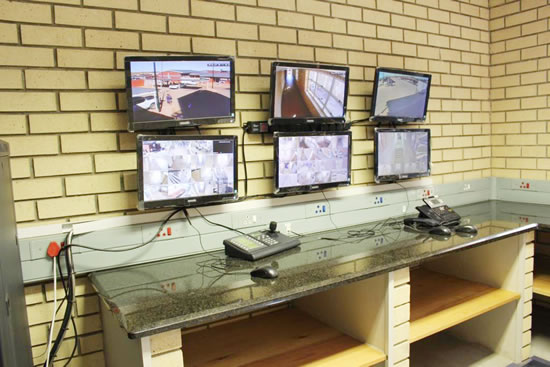
“The police cannot stop teenagers and adolescents from consuming alcohol unless the parents report it and report the dealer who sold them that alcohol in the first place,” said Minister Nhleko.
The Minister also said that the SAPS has already shut down 71 of the 102 illegally operating taverns in the area of Madadeni, while 82 legally owned and operated taverns continue conducting business.
“This area has more taverns than it has churches. We cannot have a bright future as a nation if young people are found drinking half the time. Our people should be engaged in activities that speak to empowerment and advancement.”
Minister Nhleko said the local CPF and Madadeni SAPS members must find ways to work with the community to find solutions and ensure that all members of the community are safe.
“Safety is a basic human right enshrined in the Constitution, however we are still unable to guarantee that right because our communities are also a hiding ground for criminals. It should start with you.”
*Malibongwe Nzuza works for the SAPS in KwaZulu-Natal.
Africa owns its destiny
Africa owns its destiny JoyInternational relations
President Jacob Zuma says Africa is increasingly taking ownership and responsibility for its socio-economic destiny.
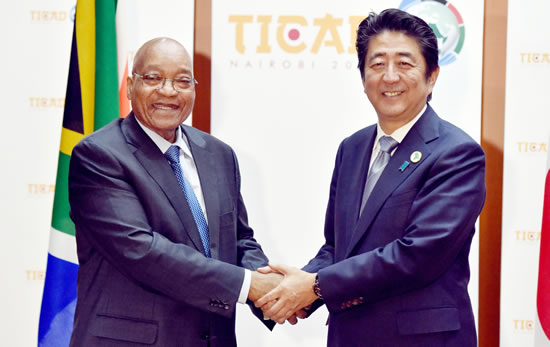 “We are committed to placing the continent firmly on a path of sustainable economic growth and development, and thus addressing the scourges of inequality, poverty and unemployment.
“We are committed to placing the continent firmly on a path of sustainable economic growth and development, and thus addressing the scourges of inequality, poverty and unemployment.
“Bearing this in mind, collaboration and investments by both the public and private sectors in infrastructure, manufacturing and information and communications technology (ICT) are essential for regional and continental growth,” said President Zuma.
The President was speaking at the 6th Summit of the Tokyo International Conference on African Development (TICAD VI), held in Nairobi, Kenya.
The TICAD VI Summit is a process that was initiated in 1993 as a platform for African development, specifically aimed at mobilising humanitarian aid and Official Development Assistance.
President Zuma noted that continental integration, boosting Intra-African trade and improving the continent’s capacity to resolve its own challenges, as identified by Agenda 2063, have been woven into every discussion he had across the globe, from climate change to governance and industrialisation.
“Let me briefly cite one example of what the continent is doing in terms of infrastructure development, namely the Presidential Infrastructure Championing Initiative, which is supported by Nepad. The Algerian section of the optic-fibre link between Algeria and Nigeria via Niger has been completed and is now fully operational, improving Internet services and reducing the cost of ICT.
“It is expected that the optic fibre [network] will be further extended to neighbouring states. This is but one good example of the success of these projects in our continent. There are massive mutually beneficial opportunities available in Africa,” President Zuma said.
He urged all parties in TICAD to focus on its effective implementation, and for countries to intensify their collaborative efforts for the African Agenda.
This year’s summit is significant as it is the first to be hosted in Africa.
Bilateral relations between South Africa and Japan remain cordial and continue to strengthen, with regular exchanges of high-level visits, an increase in Japanese investments in South Africa and a wide range of technical areas of cooperation.
South Africa is Japan’s largest trade partner in Africa. It is estimated that about 140 Japanese firms, employing over 140 000 South Africans, operate in South Africa.
Swaziland hosts successful SADC meeting
Swaziland hosts successful SADC meeting JoyInternational relations
The meeting of the Summit of the Heads of State and Government of the Southern African Development Community (SADC), held in Swaziland recently ended on a high note.
The 36th Ordinary SADC Summit of Heads of State and Government was held under the theme: “Resource Mobilisation for Investment in Sustainable Energy Infrastructure for an Inclusive SADC Industrialization and for the Prosperity of the Region”.
The SADC Summit is a statutory meeting of the 15-nation regional body which meets annually in August. The Summit considers matters from different sectors for decision and noting. The Summit also examines the performance of SADC institutions and reviews the overall implementation of the regional body's socio-economic programmes.
President Zuma said summit was a success following positive discussions and decisions and said the outcomes of the summit showed the commitment by member states to ensure integrated development in the region.
“The summit was a success as we dealt with a number of important issues that affect the region most in particular issues around industrialisation, energy and infrastructure development.
“As leaders we have further reiterated that the time to implement Harare decisions on industrialisation and creating vibrant economies has come to ensure that we develop our economy, create jobs and fight poverty in our region.
“The fact that we want to industrialise our region and create integrated economy, we have all agreed that projects that should be prioritised at a regional level for the immediate term should be those that will promote regional integration and unlock regional growth.
The Summit noted and welcomed a report presented by the SADC Secretariat, to identify priority infrastructure and energy projects to be implemented as part of the Revised SADC Regional Indicative Strategic Plan to bring about regional economic integration and eradicate poverty.
President Zuma further said the summit also received progress reports on various political and security matters including, in particular, issues relating to the Kingdom of Lesotho and Democratic Republic of Congo.
“We have all committed ourselves to swiftly implement the recommendations as presented in the reports to ensure peace, unity and stability in affected areas,” the President said.
SADC Executive Secretary Dr. Stergomena Lawrence Tax mentioned among others that a five-year Plan Investment Plan for implementation of the SADC Regional Agricultural Policy (RAP) 2014 which seeks to ensure long term food security and reduction of social and economic vulnerability was finalised. In the area of Infrastructure, she reported that the roll out of regional projects by SADC Regional Infrastructure Development Master Plan (RIDMP” is on course.
The summit also elected South Africa elected as the Incoming Chairperson of SADC.
“We are extremely honoured to have been elected as the incoming Chairperson of SADC. This is a responsibility we take very seriously.
“We equally wish to affirm our total commitment to carry out this huge responsibility to the best of our ability,” President Jacob Zuma said in his acceptance speech.
South Africa will host the 37th Ordinary SADC Summit scheduled for August 2017.
Know your Minister
Know your Minister JoyMinister Thulas Nxesi is the Minister of Public Works of the Republic of South Africa. He has held this position since October 2011.
About the Minister
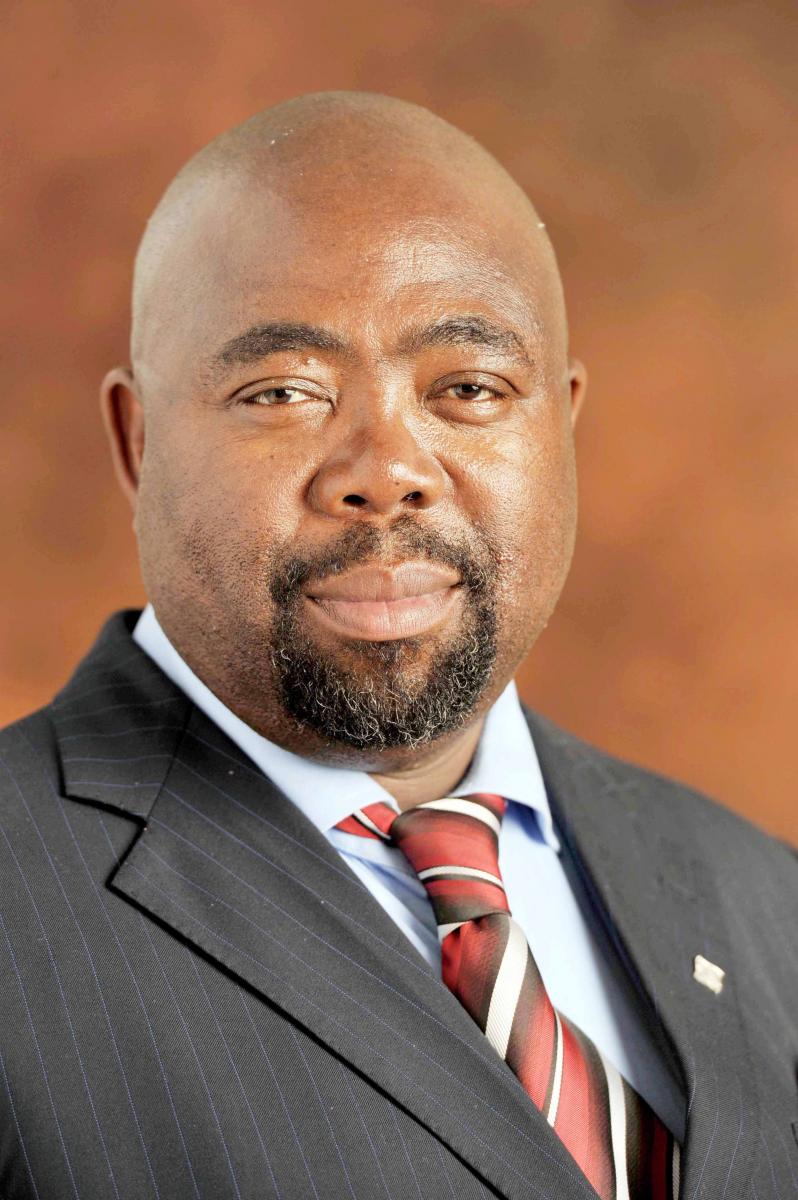 Minister Nxesi holds a Bachelor of Arts degree from Fort Hare University, a Bachelor of Education degree from Witwatersrand University as well as a Higher Diploma in Education from the University of South Africa (UNISA).
Minister Nxesi holds a Bachelor of Arts degree from Fort Hare University, a Bachelor of Education degree from Witwatersrand University as well as a Higher Diploma in Education from the University of South Africa (UNISA).
Minister Nxesi began his career as a teacher at Ikusasa Senior Secondary School between 1985 and 1990. Between 1994 and 2010 he held the position of an Assistant Secretary General and Secretary General at the South African Teacher’s Union (SADTU).
Prior to being appointed Minister of Public Works, he was the Deputy Minister of Rural Development and Land Reform between November 2010 and October 2011. He also served as President of Education International and Secretary of National Education Union of South Africa (NEUSA).
About the Department
The department is the custodian for all national governments’ fixed assets, for which other legislation does not make another department or institution responsible. This includes the determination of accommodation requirements, rendering expert built environment services to client departments, the acquisition, maintenance and disposal of such assets.
SA aims for more gold
SA aims for more gold JoySport, Arts and Culture
Following the successful showing of Team South Africa at the recent Rio Olympics, South African has sent another team to fly the flag even higher at the Rio 2016 Paralympics.
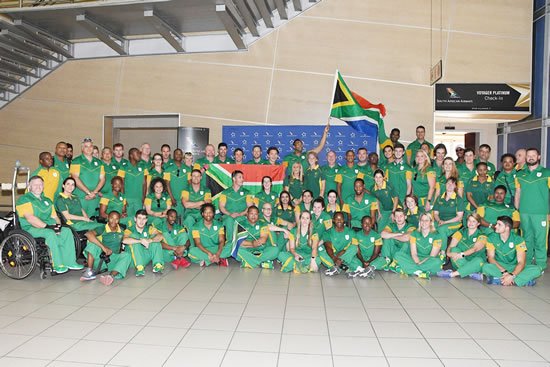 The Olympic body has sent 45 athletes to the games with a target of 25 medals. The team will compete in nine sporting codes. The codes are swimming, athletics, para-canoeing, para-cycling, para-equestrian, para-powerlifting, para-cycling, para-shooting and wheelchair tennis.
The Olympic body has sent 45 athletes to the games with a target of 25 medals. The team will compete in nine sporting codes. The codes are swimming, athletics, para-canoeing, para-cycling, para-equestrian, para-powerlifting, para-cycling, para-shooting and wheelchair tennis.
Chief Executive Officer of the South African Sports Confederation and Olympic Committee (SASCOC) Tubby Reddy said the Olympic body has done a lot in preparing the team for the Paralympic Games.
“We believe the team is ready. Through the Operation Excellence programme SASCOC has offered financial support to athletes including in qualification events, training camps and competition so that they could prepare for the Paralympic Games. As the National Paralympic Committee, SASCOC also paid for athletes who are not on the Operation Excellence (OPEX).”
Reddy added that the team’s experience will help it in representing the country and compete with the best from other parts of the world.
“We believe the team is a blend of experienced and new talent with many team members having worn the green and gold of Team South Africa at previous Olympic Games.
“Team SA has world-class athletes who have performed well in various international events and their names are well known on the international map thus they will be good ambassadors of the country,” he said.
Honouring a South African heroine
Honouring a South African heroine JoySport, Arts and Culture
During August South Africa celebrated the life of Krotoa, a Khoi woman who served as an interpreter between Jan van Riebeeck and the Khoi people.
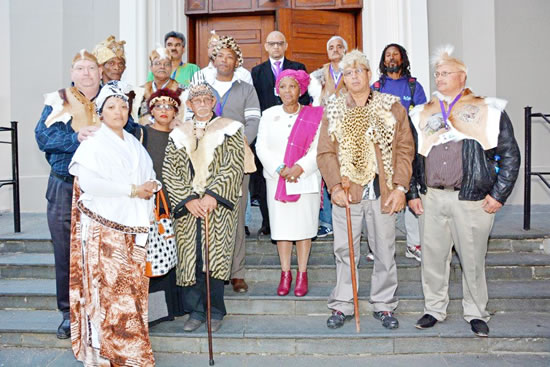 Defence and Military Veterans Minister Nosiviwe Mapisa-Nqakula unveiled a monument in Krotoa’s honour at the Castle of Good Hope, which she said symbolised the painful role that women have played in the country’s history.
Defence and Military Veterans Minister Nosiviwe Mapisa-Nqakula unveiled a monument in Krotoa’s honour at the Castle of Good Hope, which she said symbolised the painful role that women have played in the country’s history.
“We have chosen the life of our mother Krotoa, to signify the somehow uncelebrated role of women in shaping events that have crafted the destiny of our nation’s history,” she said.
Krotoa is credited with being instrumental in working out the terms for ending the first Dutch-Khoi War in the 17th century.
She was good with languages and later established herself as a reliable interpreter between the Dutch and the Khoi tribes.
Krotoa also acted as a facilitator between the Dutch and the Khoi, resulting in her being snubbed by the Khoi people.
She was baptised as a Christian and named Eva. Later she married a Danish surgeon called Pieter van Meerhof, in what was to become the first recorded official mixed race marriage in South Africa.
After her husband was killed in a slave hunt in Madagascar, Krotoa returned to the Dutch Colony to reclaim her status, but was turned down.
Krotoa was later banished to Robben Island where she stayed until she died.
Her children were sent to Mauritius, but returned to South Africa after her death.
Her remains were buried on the grounds of the Castle of Good Hope.
About 100 years after she was buried, her bones were removed from the grounds of the Castle of Good Hope and reburied in an unmarked grave at Die Groote Kerk, near what is now Church Square in Cape Town.
When Minister Mapisa-Nqakula visited Cape Town in August, during an occasion that coincided with the 60th anniversary of the Women’s March to the Union Buildings, she attended the repatriation of Krotoa’s spirit from the church to the Castle of Good Hope, where the Minister unveiled a monument to honour the Khoi heroine.
Did you know?
This year marks 350 years since the Castle of Good Hope was built. The Castle of Good Hope, which housed the first formal seat of Parliament, is now being restored to serve as a symbol of unity and hope.

